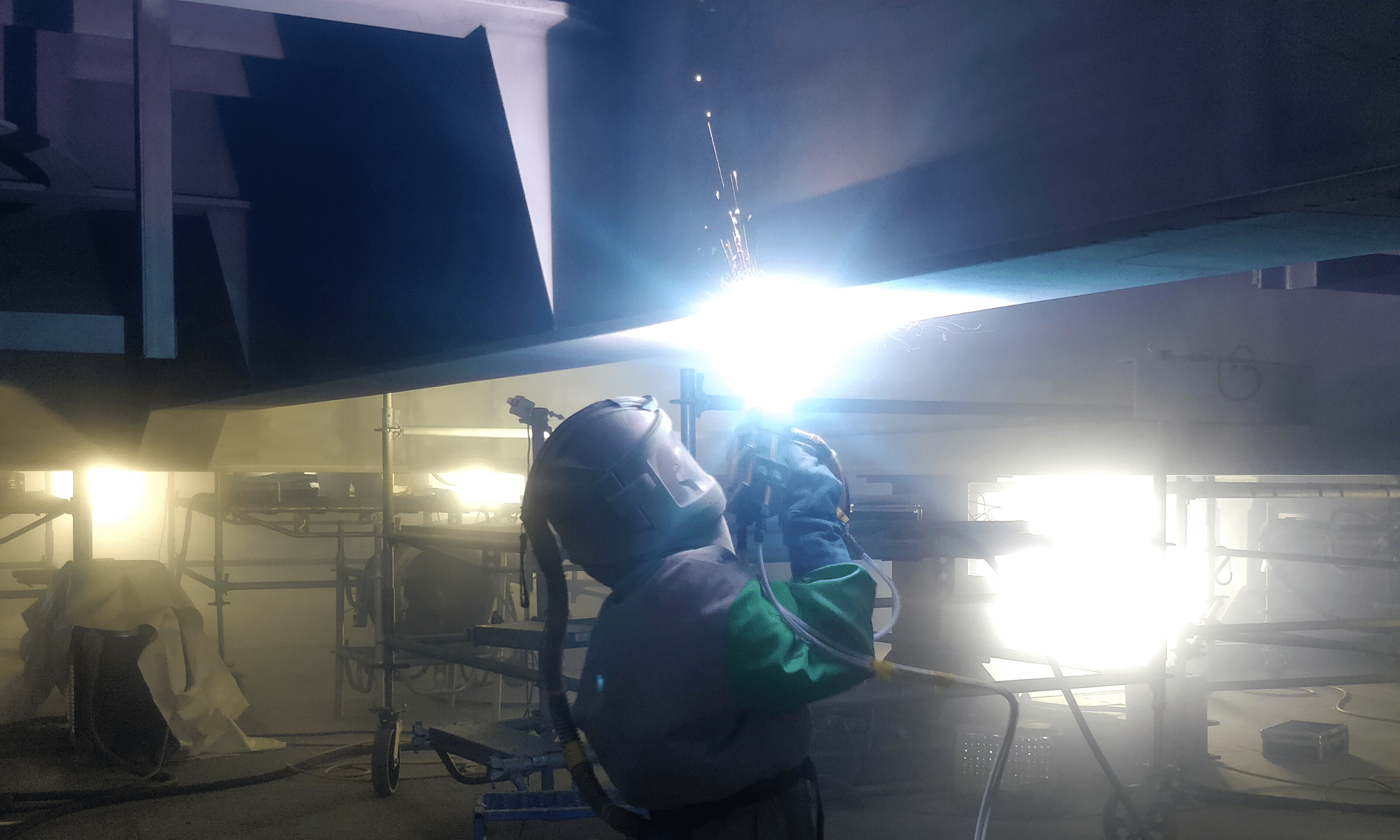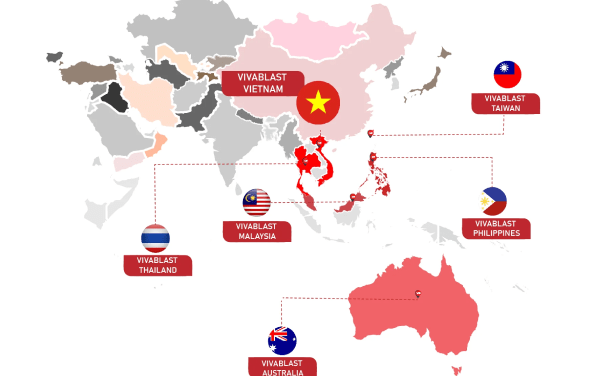Anti-corrosion contractors play an increasingly important role in protecting buildings and infrastructure from the adverse effects of metal corrosion. In today’s article, we will learn about the working principles of anti-corrosion contractors and the anti-corrosion services available at VIVABLAST – Vietnam’s leading contractor.
Anti-corrosion contractor: Basic principles and working rules to bring out the best services
The article will go through 3 main contents in turn:
- About anti-corrosion contractors: Who they are and what are their working principles
- 10 “golden” rules that a professional contractor always applies
- Introducing three typical anti-corrosion services that VIVABLAST is providing
Who are anti-corrosion contractors and what are their working principles?
Anti-corrosion contractors specialize in anti-corrosion construction for many different types of projects. Their scope of work includes assessment, consultation and tailor-made anti-corrosion solutions for each project specification.After completion, contractors with good service quality will have an additional inspection and warranty policy. Using an outsourced contractor is a cost- and labor-saving solution because it will be costly if we set up a separate repair team. Besides, these partners also have better expertise and experience, from which they can execute better than ordinary workers.
Using an outsourced contractor is a cost- and labor-saving solution because it will be costly if we set up a separate repair team. Besides, these partners also have better expertise and experience, from which they can execute better than ordinary workers.
Read more about which methods do anti-corrosion contractors use to protect construction?
To ensure the quality of construction, contractors usually follow the following three principles:
1. Creating a protective layer that prevents the ingress of charged ions, water and oxygen:
To create a protective barrier, the contractor applies an anti-corrosion coating 200 to 350 microns thick, composed of epoxides and polyurethanes. By adding elements such as aluminum foil, this barrier layer can enhance performance. However, corrosion will begin to spread from this damaged area if the barrier is damaged. Then, corrosion will enter the steel substrate, known as submembrane rust.
2. Ensuring not too high contact between steel and other metal to protect the steel cathode
The galvanic effect (cathodic protection) is possible for coatings containing large amounts of metallic zinc or aluminum. The anti-corrosion coating must provide mutual contact between individual metal pigment particles and between these particles and the steel to provide adequate protection.These coatings require the Anti-corrosion contractors to clean the steel surface thoroughly, especially for zinc silicates. A smooth and clean surface ensures a long and durable coating. When first applied, zinc silicate will be very porous. After a while, the voids are filled with zinc-based anti-corrosion products, forming a protective barrier.
3. The use of corrosion inhibitors for coatings
Corrosion inhibition is achieved using primers containing inhibitors solubilizers designed to limit the corrosion process.Inhibitors reduce the rate of anodic or cathodic processes or create a highly resistive film on the surface.We use an inhibitor-free topcoat to prevent this film from being washed away from the primer. However, due to the water solubility of the substances used, inhibitor primers are not suitable for prolonged water immersion, as they can blister and damage the anti-corrosion coating. In such a case, we need to take protective measures in time if the damaged area is not too large. When the inhibitor is exhausted, corrosion will take place.
10 “golden” rules that a professional anti-corrosion contractor always applies
Anti-corrosion coating provides excellent protection benefits for metal surfaces. However, that is only true when it is properly constructed. To ensure a qualified coating, professional anti-corrosion contractors will follow these rules:
1. Limiting coating cracks
Cracks in the coating can occur when:
- The coating is too thick
- Using too much thinner in paint
- The nozzle is placed too close to the painted surface
- Spray continuously for too long in one position
Therefore, construction workers need to avoid these mistakes so as not to cause cracking.
2. Mixing paint in the proper ratio
Paint that is too thin or has a low viscosity can cause runs. The overuse of thinners and the use of the wrong solvent also cause orange peel – the surface of the coating is pitted like an orange peel.
3. Preparing the surface carefully to avoid cissing
Cissing, also known as fisheye, are tiny holes in the anti-corrosion layer. This phenomenon is caused by poor preparation, causing surface contamination, high humidity, grease, or improper surface wetting.
4. Painting in moderate thickness
Too much coating on horizontal surfaces causes stress inside the coating, causing it to crack as it cures. The too-thick coating is also straightforward to peel off from the surface.
5. Ingenious nozzle controlling
External factors, such as wind, can cause excessive spraying or dry spraying or can also be due to poor sprayer technique. When sprayed excessively, the paint particles are often small and have poor adhesion, creating a rapidly degraded coating. Therefore, the anti-corrosion contractor needs to spray well to make the complete paint layer.
6. Cleaning the surface thoroughly to remove grit
If the surface is not appropriately cleaned after abrasive blasting or if dust and grit during blast adhere to a coat before applying the next coat, the grinding wheel will become trapped. The steel particles will be eroded when water seeps through the paint and the anti-corrosion coating is forced out of the steel.The outer coating will be damaged if grit is trapped between the layers of anti-corrosion paint. Gravel trapped in the outer coating will also corrode and cause stress in the anti-corrosion coating, reducing its integrity and life span.7. Carefully checking the coverage of the paint
If the anti-corrosion layer does not cover the entire surface of the material, it is impossible to provide optimal protection. Areas that need special inspection include edges, welds, small areas…
8. Be careful when walking on painted surfaces
Painters from the anti-corrosion contractor often step on the painted surface to check the DFT. However, if the paint is still soft and has not cured, it will leave footprints. These footprints will have a thinner coating thickness, resulting in an uneven coating.
9. Check the expiration date of the paint
In fact, anti-corrosion paint that is past its expiry date can still be used, but it cannot provide the best effective coating. Therefore, it is better to use newly produced paint that has not yet expired.
10. Choose the right time to start construction
Some paints require a certain waiting period after mixing before they can be used, noted on the manufacturer’s information sheet. Failure to follow these recommendations may result in poor adhesion or poor performance.
VIVABLAST – High-quality anti-corrosion contractor with 3 outstanding services
VIVABLAST is currently one of the leading anti-corrosion contractors in Vietnam, with nearly three decades of experience in corrosion protection. Our activities range from civil to industrial projects, from land to offshore. Currently, VIVABLAST is focusing on performing three types of anti-corrosion services as follows:
1. Thermal spray coating
Thermal spray coating is a technique that converts a solid material in the form of powder, wire, rod… into a high-energy flow of matter such as flammable gas or a plasma stream, thereby melting some or all of the material. This process helps to disperse the material into fine mist particles while the heat accelerates the particles and pushes them to the coated surface. VIVABLAST provides premium heat coating services such as Heat Spray Aluminum (TSA) / Zinc (TSZ) / other metal alloys on NORSOK M-501.The thermal coating provides excellent protection against corrosive agents and extreme weather conditions. This is considered a cost-effective and straightforward solution.
VIVABLAST provides premium heat coating services such as Heat Spray Aluminum (TSA) / Zinc (TSZ) / other metal alloys on NORSOK M-501.The thermal coating provides excellent protection against corrosive agents and extreme weather conditions. This is considered a cost-effective and straightforward solution.
2. Anti-corrosion bandage
Anti-corrosion bandage is a bandage made of 2 layers of anti-corrosion bitumen plastic, covered with a PE plastic layer. This feature supports the material to avoid impact and, at the same time, possibly caused by external agents. More specifically, the bitumen layer can also improve the tightness when used for materials that need it and support tighter wrapping when used for metal pipes. As a high-quality anti-corrosion contractor, VIVABLAST uses FlexiSeal bandages, high-adhesive Bitumen Polymer bandages, and a PVC layer to resist external shocks. The technology from this cuff is dedicated to the protection and corrosion protection of medium to substantial diameter pipes.
As a high-quality anti-corrosion contractor, VIVABLAST uses FlexiSeal bandages, high-adhesive Bitumen Polymer bandages, and a PVC layer to resist external shocks. The technology from this cuff is dedicated to the protection and corrosion protection of medium to substantial diameter pipes.
3. Jetty pile wrapping
Jetty pile wrapping is a vital protection method for offshore constructions against corrosive solid agents such as seawater, wind, and microorganisms…VIVABLAST applies modern protection solutions for wharf piles and concrete pipelines. Our technicians install the RAM 200 series steel pipe/pile protection system to provide long-term resilience to structures, even deep-sea components. If you are looking for a reputable, professional, qualified anti-corrosion contractor at a reasonable price, then VIVABLAST is a worthy choice. Depending on the characteristics of the project, our team will provide an accurate assessment and solution. A team of well-trained technicians also undertakes our construction process, and the execution process is strictly controlled to minimize errors. For direct consultation, don’t hesitate to get in touch with us via:
If you are looking for a reputable, professional, qualified anti-corrosion contractor at a reasonable price, then VIVABLAST is a worthy choice. Depending on the characteristics of the project, our team will provide an accurate assessment and solution. A team of well-trained technicians also undertakes our construction process, and the execution process is strictly controlled to minimize errors. For direct consultation, don’t hesitate to get in touch with us via:
- Phone: (+ 84-28) 38 965 006/7/8
- Fax: (+ 84-28) 38 965 004
- Email: vivablast@vivablast.com



